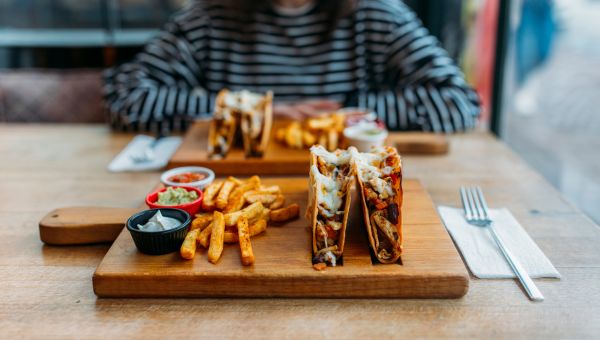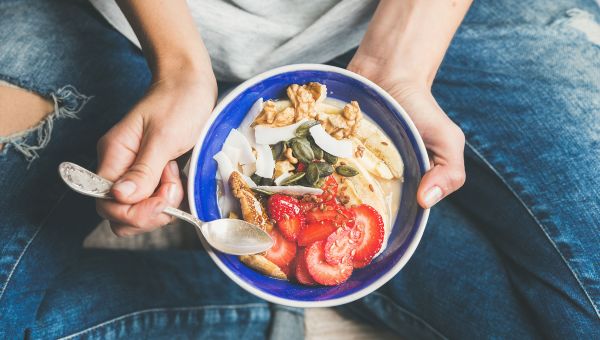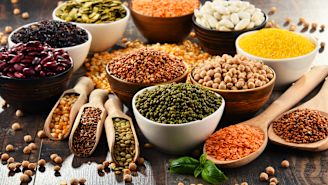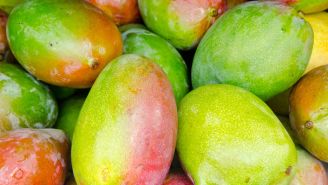4 simple ways to reduce bloating
If you feel uncomfortably swollen and full, try these easy tips to find relief.
Updated on June 28, 2023

Bloating can happen to anyone, at any time. It’s that uncomfortable feeling of fullness and tightness that challenges the waistband of even your most comfortable jeans.
Bloating—which occurs when there’s a buildup of gas or air in your digestive system—can be caused by a variety of things, including constipation, menstruation, stress, an imbalance of gut bacteria, and the food that you eat.
Feeling bloated on occasion is fairly common and often treatable. You may even be able to prevent it from happening in the first place by making a few simple diet and lifestyle changes.
With that in mind, here are some strategies to help you prevent or ease bloating.

Steer clear of certain foods
Some foods, such as legumes (beans and lentils), onions, and garlic, are more likely to cause bloating than others. Foods containing certain artificial sweeteners such as xylitol and sorbitol may also produce symptoms, so check the labels of any sugar-free gums and candy. Since carbonated beverages can also cause bloating, you may want to consider swapping out sodas or other fizzy drinks for iced tea or water.
Some people have food intolerances that trigger gas and bloating. They may have a hard time digesting a natural sugar called fructose, found in honey, juice, fruit, and some vegetables. Others may find dairy products problematic because they contain a different natural sugar, called lactose.
If you feel bloated after eating, it may help to keep a food journal. Record what you have for each of your meals, noting when you have digestive symptoms. You may start to notice patterns and certain foods that trigger bloating or other discomfort.
Then speak with your healthcare provider (HCP). Your HCP may recommend cutting back on the foods triggering your symptoms and making some strategic swaps. For example, if dairy products give you a hard time, you might opt for plant-based milks and cheeses that are free of lactose. Another adjustment may include opting for coconut yogurts, cashew cheeses, and cashew, oat, almond, soy or coconut milks in place of cow-based products.

Change your eating habits
Sometimes, bloating isn’t a result of what you eat, but how quickly you speed through a meal. The faster you eat, the more air you may swallow, which can create a buildup of gas. This can contribute to bloating.
The simple solution? Slow down while you’re eating, and make sure to chew your food thoroughly. It can be hard to take the time when you’re eating on the run, but spending a few extra minutes eating mindfully can help ease bloating later on. Two other habits can increase the amount of air you swallow, leading to bloating: chewing gum and smoking. Consider carrying around a water bottle instead of a pack of gum. And if you smoke, this is just one more reason to quit. Take steps to help you kick the habit for good.

Get regular exercise
Getting that gas moving through your digestive system can make you feel a whole lot better—and one effective way to do that is exercising,
You don’t have to put in long stretches in the gym to get the benefit. Breaking your workout up into 10- or 15-minute intervals is just as effective. Most people should aim to get at least the recommended 150 minutes of moderate aerobic activity or 75 minutes of vigorous aerobic activity per week. Resistance training is important, too; try muscle-strengthening exercises twice a week.

Ask about medication
If you’re still not getting relief from bloating, ask your healthcare provider about trying OTC products, such as Gas-X and Alka Seltzer Anti-Gas, which contain simethicone—an ingredient that helps break up gas bubbles in your digestive tract.
You can also try products, such as Beano and Gas-X Prevention—they contain an enzyme called alpha-galactosidase, which aids in the digestion of complex carbohydrates, such as those found in beans and lentils. If you discover that dairy products are the cause of your bloating, try OTC meds containing lactase, such as Lactaid.

If symptoms persist, seek help
While most cases of bloating can be treated with dietary and lifestyle changes, for some people it’s a sign that something else is going on. Some serious conditions that cause bloating include:
- Functional dyspepsia (indigestion without cause)
- Gastroparesis (delay in the emptying of the stomach)
- Irritable bowel syndrome (IBS)
- Celiac disease
- Certain types of cancer, including ovarian, stomach and colon cancer
If your bloating doesn’t subside, becomes severe, or happens consistently without an obvious cause, reach out to your HCP. Bloating accompanied by nausea, vomiting, or bloody stools—anything gastrointestinal-related—is also a sign that you need medical attention.

Johns Hopkins Medicine. “Bloating: Causes and Prevention Tips.” 2020. Accessed November 12, 2020.
Dana Sparks. “Home Remedies: Gas, belching and bloating.” Mayo Clinic News Network. November 25, 2016.
UpToDate.com. “Patient education: Gas and Bloating (Beyond the Basics).” October 2020. Accessed November 12, 2020.
American Cancer Society. “Signs and Symptoms of Ovarian Cancer.” April 11, 2018. Accessed November 12, 2020.
Mayo Clinic. “Belching, gas and bloating: Tips for reducing them.” February 13, 2020. Accessed December 21, 2020.
FamilyDoctor.org. “Bloating.” January 11, 2019. Accessed December 21, 2020.
Mayo Clinic. “Gas and gas pains.” March 3, 2020. Accessed December 21, 2020.
JM Wilkinson, EW Coznie, & CG Loftus. “Gas, Bloating, and Belching: Approach to Evaluation and Management.” American Family Physician. March 1, 2019. 1;99(5):301-309.
Mayo Clinic. “Lactose intolerance.” April 7, 2020. Accessed December 21, 2020.
Dairy Australia. “Do Dairy Foods Cause Bloating?” 2019. Accessed December 21, 2020.
Mayo Clinic. “Fructose intolerance: Which foods to avoid?” November 6, 2019. Accessed December 21, 2020.
Gas-X.com. “Eating Too Fast May Cause Bloating.” 2020. Accessed December 21, 2020.
Northwestern Medicine. “Quick Dose: Is Eating Too Fast Unhealthy?” 2020. Accessed December 21, 2020.
TG Cotter, M Gurney, & CG Loftus. “Gas and Bloating—Controlling Emissions: A Case-Based Review for the Primary Care Provider.” Mayo Clinic Proceedings. August 2016. Volume 91, Issue 8, pages 1105-1113.
U.S. Department of Health and Human Services. “Physical Activity Guidelines for Americans 2nd Edition.” 2018. Accessed December 21, 2020.
W Stephen Pray. “Strategies for the Relief of Bloating and Gas.” U.S. Pharmacist. December 17, 2009. 34(12):16-22.
Mayo Clinic. “Functional dyspepsia.” April 3, 2020. Accessed December 21, 2020.
Harvard Health Publishing. “What’s causing that belly bloat?” October 13, 2020. Accessed December 21, 2020.
More On


video

article

slideshow


video


video
